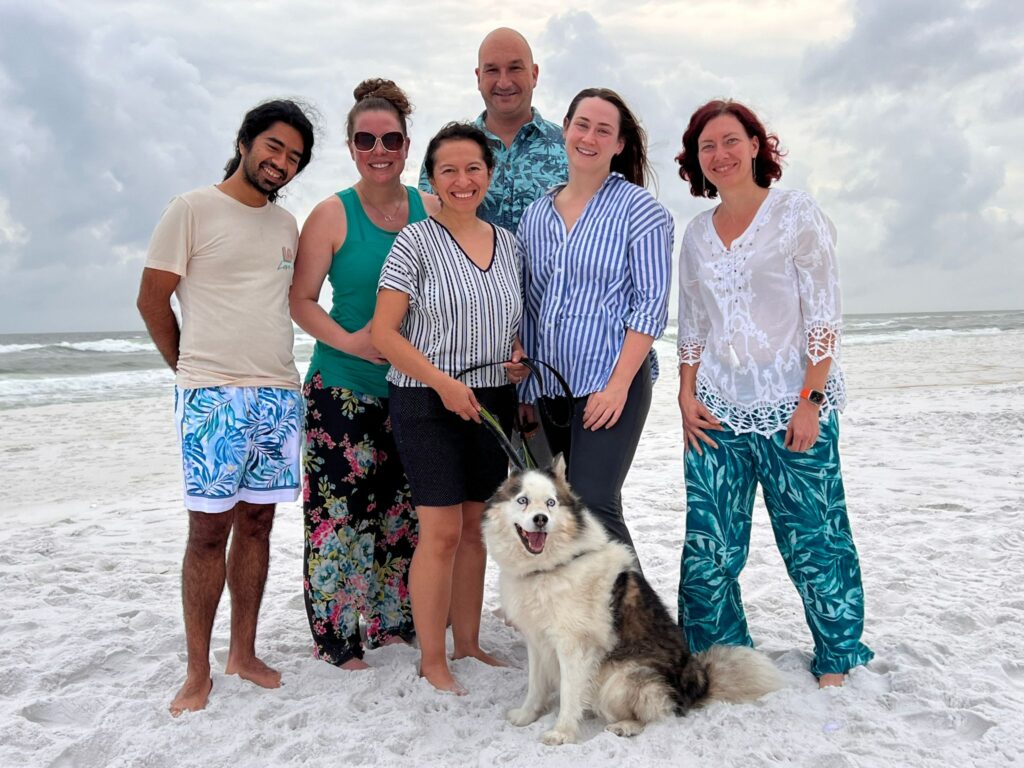by Robert
You’re probably wondering why it’s been so quiet on our end this past week. Well, we’ve been incredibly busy! First, we had another fantastic Leadership Lab, co-hosted with Ana Pineda. Around 200 people were interested in learning how our P^4 Framework can help them do research without suffering.
If you’re interested, you still have the chance to watch the recording until November 30. Just register here, and you’ll also gain access to the templates presented during the Leadership Lab.
After a very short night following the Leadership Lab, I (Robert) had to catch a flight to make it in time to prepare for our “I Strategize 2025” retreat across the Atlantic. This week, I’d like to give you a bit more context on it. We started at the high level of visions and missions, then worked our way down through long-term goals to annual goals for 2025. We got even more detailed by defining objectives for the first quarter and breaking down the necessary key results at a very granular level. For grant and paper submissions, we used reverse planning from the deadline to determine when each milestone must be completed to avoid last-minute stress. To ensure it all gets implemented, everything – including the first work blocks – was immediately scheduled in the calendar.
Additionally, all participants developed a plan for what can be done in the coming weeks as preparatory steps for a successful 2025 – both professionally and personally. We also discussed risks, mitigation strategies, and ways to plan monthly, weekly, and even daily.

The process yielded so many insights for the participants as well as for Stefanie and me – enough to fill a book, for sure! I’ll sum it up with a content insight, a process insight, and an emotional insight.
Content insight
If you have a descending cascade of Vision – Mission – Long-term Goals – Annual Goals – Quarterly OKRs – Weekly Goals – Daily Goals, then every task the team has to accomplish has a clear purpose. Why do I need to reach today’s goal? To meet the weekly goal. Why meet the weekly goal? To achieve the OKRs. And so on. When you communicate this transparently and consistently to the team, it tremendously boosts their motivation.
Process insight
You can’t do this online. All participants agreed that, for this kind of exercise, you need to step away from everyday life – not only professionally but also personally. When thinking about strategy, you need time for relaxation and downtime after the workshops to fully process everything. If you don’t have this and return to the usual, loving chaos of small tasks and problems after a demanding retreat day, you can’t internalize the insights gained. It’s also harder to engage with visionary thinking when you’re preoccupied with laundry, dinner, school pickups, etc.
Emotional insight
Outlining, organizing, and visualizing all your information and thoughts for the coming year strengthens your peace of mind. I think we all make plans for the next year, but putting it all into a shared context, identifying dependencies, problems, and priorities early on gives you a lot of self-confidence. All our participants left the retreat with a strong sense that they could achieve their ambitious 2025 goals. Knowing there’s a plan, what it looks like, and having plan B and C in place if high-impact risks occur – without needing to work overtime or jeopardize your health – is also a huge emotional relief.
And when all this is done in a relaxed setting – preparing meals together, enjoying good food, having deep discussions over a glass of wine, and taking beach walks – you come home truly energized, even though all participants considered the work sessions as hard work.
To conclude, we asked for feedback by having everyone share their expectations before and outcomes after the retreat.
Here’s what two of our participants had to say:
Yash: “Expectations: I was hoping to learn about strategies for developing a team and processes for sustaining motivation and goals.
Outcomes: I came away with a greater sense of purpose and priorities for my research program and learned strategies and processes for helping teams stay on track. I also learned that, to make several decisions about my team’s future, I needed to focus my vision and hone in on the questions and approaches I wanted to use in the next few years to lend more clarity to my team.
Experience: The retreat was challenging and rewarding. Learning to organize and manage personal and professional long- and short-term goals and cascading planning was difficult but satisfying, and also useful for planning and mapping out my path.”
Liz: “I signed up for the retreat to give myself protected and dedicated time for organizing my grant and paper submissions for 2025. I not only accomplished that but was able to define goals beyond just grants and papers, goals that will keep me focused beyond 2025. I learned several skills and processes, and the structure of the retreat allowed me time to begin implementing them immediately. I feel an overall sense of calm knowing that I am working towards things that are important to me and my team, and learned new tools to stay motivated and mentor my trainees.”
Finally, an insight I gained: When you bring together such a diverse group – and I don’t just mean diversity in gender or background, although we were diverse in those ways, too – with very different personalities, needs, and behaviors in this kind of setting, the shared insights through perspective shifts are even greater and help balance everything much better. For example, being either big-picture-oriented or detail-oriented can both be effective approaches, as long as neither is entirely neglected. Or having a discussion within a group that includes both types of thinkers on what should be communicated to the team is invaluable. Some people get more excited about starting something new, while others are more motivated by completing tasks. Put them together in a room, and you’ll have a fruitful conversation on how to start and end a new endeavor with joy.
For next year, we’re planning two retreats: one in the spring in Europe and another in the fall in the Americas. If you’re interested, just send us an email at robert@glia-leadership.com or stefanie@stefanierobel.com and we put you on a list of interested people.
With wonderful memories of the past days with amazing people, I stop here.
Robert







